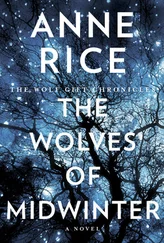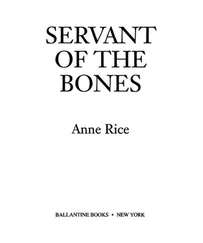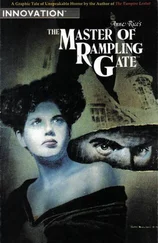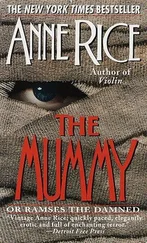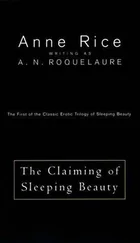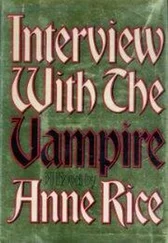Anne Rice - The Vampire Armand
Здесь есть возможность читать онлайн «Anne Rice - The Vampire Armand» весь текст электронной книги совершенно бесплатно (целиком полную версию без сокращений). В некоторых случаях можно слушать аудио, скачать через торрент в формате fb2 и присутствует краткое содержание. Жанр: Ужасы и Мистика, на английском языке. Описание произведения, (предисловие) а так же отзывы посетителей доступны на портале библиотеки ЛибКат.
- Название:The Vampire Armand
- Автор:
- Жанр:
- Год:неизвестен
- ISBN:нет данных
- Рейтинг книги:4 / 5. Голосов: 1
-
Избранное:Добавить в избранное
- Отзывы:
-
Ваша оценка:
- 80
- 1
- 2
- 3
- 4
- 5
The Vampire Armand: краткое содержание, описание и аннотация
Предлагаем к чтению аннотацию, описание, краткое содержание или предисловие (зависит от того, что написал сам автор книги «The Vampire Armand»). Если вы не нашли необходимую информацию о книге — напишите в комментариях, мы постараемся отыскать её.
The Vampire Armand — читать онлайн бесплатно полную книгу (весь текст) целиком
Ниже представлен текст книги, разбитый по страницам. Система сохранения места последней прочитанной страницы, позволяет с удобством читать онлайн бесплатно книгу «The Vampire Armand», без необходимости каждый раз заново искать на чём Вы остановились. Поставьте закладку, и сможете в любой момент перейти на страницу, на которой закончили чтение.
Интервал:
Закладка:
Yes, well, it was Venice, this place that must erase from my mind, at least for a while, the clotted torment of some earlier existence, some congestion of all truths I would not face.
My Master would never have been there, had it not been Venice.
Not a month later he would tell me matter-of-factly what each of the cities of Italy had to offer him, how he loved to watch Michelangelo, the great sculptor, hard at work in Florence, how he went to listen to the fine teachers in Rome.
"But Venice has an art of a thousand years," he said as he himself lifted his brush to paint the huge panel before him. "Venice is in itself a work of art, a metropolis of impossible domestic temples built side by side like waxen honeycombs and maintained in ever flowing nectar by a population as busy as bees. Behold our palaces, they alone are worthy of the eye."
As time passed he would school me in the history of Venice, as did the others, dwelling on the nature of the Republic, which, though despotic in its decisions and fiercely hostile to the outsider, was nevertheless a city of "equal" men. Florence, Milan, Rome-these cities were falling under the power of small elites or powerful families and individuals, while Venice, for all her faults, remained governed by her Senators, her powerful merchants and her Council of Ten.
On that first day, an everlasting love for Venice was born in me. It seemed singularly devoid of horrors, a warm home even for its well- dressed and clever beggars, a hive of prosperity and vehement passion as well as staggering wealth.
And in the tailor shop, was I not being made up into a prince like my new friends?
Look, had I not seen Riccardo's sword? They were all noblemen.
"Forget all that has gone before," said Riccardo. "Our Master is our Lord, and we are his princes, we are his royal court. You are rich now and nothing can hurt you."
"We are not mere apprentices in the ordinary sense," said Albinus.
"We are to be sent to the University of Padua. You'll see. We are tutored in music and dance and manners as regularly as in science and literature. You will have time to see the boys who come back to visit, all gentlemen of means. Why, Giuliano was a prosperous lawyer, and one of the other boys was a physician in Torcello, an island city nearby.
"But all have independent means when they leave the Master," explained Albinus. "It's only that the Master, like all Venetians, deplores idleness. We are as well off as lazy lords from abroad who do nothing but sample our world as though it were a dish of food."
By the end of this first sunlighted adventure, this welcome into the bosom of my Master's school and his splendid city, I was combed, trimmed and dressed in the colors he would forever choose for me, sky blue for the stockings, a darker midnight blue velvet for a short belted jacket, and a tunic of an even fairer shade of azure embroidered with tiny French fleur-de-lis in thick gold thread. A bit of burgundy there might be for trimming and fur; for when the sea breezes grew strong in winter, this paradise would be what these Italians called cold.
By nightfall, I pranced on the marble tile with the others, dancing for a while to the lutes played by the younger boys, accompanied by the fragile music of the Virginal, the first keyboard instrument I had ever seen.
When the last of twilight had died beautifully into the canal outside the narrow pointed arched windows of the palazzo, I roamed about, catching random glances of myself in the many dark mirrors that rose up from the marble tile to the very ceiling of the corridor, the salon, the alcove, or whatever beautifully appointed room I should find.
I sang new words in unison with Riccardo. The great state of Venice was called the Serenissima. The black boats of the canals were gondolas. The winds that would come soon to make us all crazy were called the Sirocco. The most high ruler of this magical city was the Doge, our book tonight with the teacher was Cicero, the musical instrument which Riccardo gathered up and played with his plucking fingers was the lute. The great canopy of the Master's regal bed was a baldaquin trimmed each fortnight with new gold fringe.
I was ecstatic.
I had not merely a sword but a dagger.
Such trust. Of course I was lamblike to these others, and pretty much a lamb to myself. But never had anyone entrusted to me such bronze and steel weapons. Again, memory played its tricks. I knew how to throw a wooden spear, how to ... Alas, it became a wisp of smoke, and there lay in the air around it that I'd been committed not to weapons, but to something else, something immense which exacted all I could give it. Weapons were forbidden for me.
Well, no more. No more, no more, no more. Death had swallowed me whole and thrown me forth here. In the palazzo of my Master, in a salon of brilliantly painted battle scenes, with maps upon the ceiling, with windows of thick molded glass, I drew my sword with a great singing sound and pointed it at the future. With my dagger, after examining the emeralds and rubies of its handle, I sliced an apple in two with a gasp.
The other boys laughed at me. But it was all friendly, kind.
Soon the Master would come. Look. From room to room the youngest fellows among us, little boys who had not come out with us, now moved quickly, lifting their tapers to torches and candelabra. I stood in the door, looking to yet another and another and another. Light burst forth soundlessly in each of these rooms.
A tall man, very shadowy and plain, came in with a tattered book in his hand. His long thin hair and plain wool robe were black. His small eyes were cheerful, but his thin mouth was colorless and belligerently set.
The boys all groaned.
High narrow windows were closed against the cooler night air.
In the canal below, men sang as they drove their long narrow gondolas, voices seeming to ring, to splash up the walls, delicate, sparkling, then dying away.
I ate the apple to the last juicy speck of it. I had eaten more in this day of fruit, meat, bread, sweets and candy than a human being could possibly eat. I wasn't human. I was a hungry boy.
The teacher snapped his fingers, then took from his belt a long switch and cracked it against his own leg. "Come now," he said to the boys.
I looked up as the Master appeared.
All the boys, big and tall, babyfied and manly, ran to him and embraced him and clung to his arms as he made his inspection of the painting they had done by the long day.
The teacher waited in silence, giving the Master a humble bow.
Through the galleries we walked, the entire company, the teacher trailing behind.
The Master held out his hands, and it was a privilege to feel the touch of his cold white fingers, a privilege to catch a part of his long thick trailing red sleeves.
"Come, Amadeo, come with us."
I wanted one thing only, and it came soon enough.
They were sent off with the man who was to read Cicero. The Master's firm hands with their flashing fingernails turned me and directed me to his private rooms.
It was private here, the painted wooden doors at once bolted, the burning braziers scented with incense, perfumed smoke rising from the brass lamps. It was the soft pillows of the bed, a flower garden of stenciled and embroidered silk, floral satin, rich chenille, intricately patterned brocade. He pulled the scarlet bed curtains. The light made them transparent. Red and red and red. It was his color, he told me, as blue was to be mine.
In a universal tongue he wooed me, feeding me the images:
"Your brown eyes are amber when the fire catches them," he whispered. "Oh, but they are lustrous and dark, two glossy mirrors in which I see myself even as they keep their secrets, these dark portals of a rich soul."
I was too lost in the frigid blue of his own eyes, and the smooth gleaming coral of his lips.
Читать дальшеИнтервал:
Закладка:
Похожие книги на «The Vampire Armand»
Представляем Вашему вниманию похожие книги на «The Vampire Armand» списком для выбора. Мы отобрали схожую по названию и смыслу литературу в надежде предоставить читателям больше вариантов отыскать новые, интересные, ещё непрочитанные произведения.
Обсуждение, отзывы о книге «The Vampire Armand» и просто собственные мнения читателей. Оставьте ваши комментарии, напишите, что Вы думаете о произведении, его смысле или главных героях. Укажите что конкретно понравилось, а что нет, и почему Вы так считаете.

